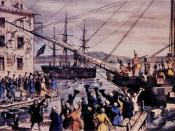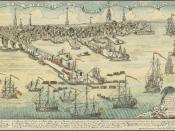One of the earliest events which eventually led to the American Revolutionary War was the Proclamation of 1763. This edict restricted European settlement of land to that which lay east of the Appalachian Mountains in order to avert new conflicts with the Indians on the west side. As an attempt to legislate racial harmony, the Proclamation was an abject failure. As an attempt to keep the colonies under further British domination, it was part of a long fuse connected to a powderkeg waiting to explode.
Watching the Seven Years War, the colonists saw an ever growing impatience within Britain to become an empire greater even than the Romans. They were also able to pick out weaknesses in the mother country against strengths in their own. Another part of the fuse lay in the cost of that war. A cost which had to be paid for by somebody. The colonists up till then had been taxed relatively little compared to their British cousins across the sea.
Another good reason to tax the colonists lay in the simple reality that the best people to tax are those far enough away that they won't rise in revolt against the King.
Several Acts were passed which stiffened the colonists's resolve to revolt, however. Perhaps being far away from the King was actually an incentive to rise against him. In hot pursuit of one another there came crashing down upon the colonists the Currency Act, the Sugar Act, the Quartering Act and the Stamp Act.
The Currency Act made it illegal to use paper money as legal tender for payment of debts, a development which had the result of restricting much trade. The Sugar Act was a follow-up to the Molasses Act of 1733 which had not been as diligently enforced as it might have...


